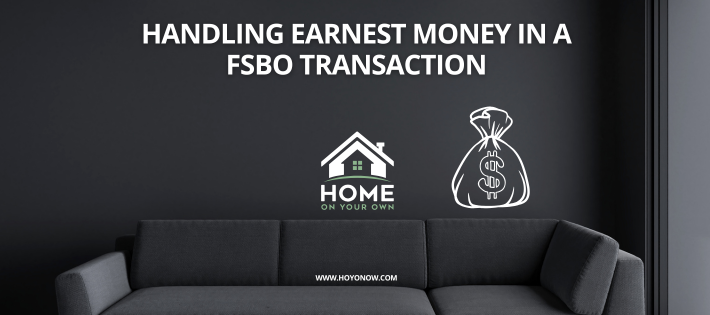By Robert Urban, FSBO Seller, Amateur Escrow Specialist, and Guy Who’s Definitely Double-Checked That Bank Wire Three Times
You’ve found a buyer.
They love the house, you’ve agreed on the price, and your finger’s hovering over the “mark as pending” button like it’s a nuclear launch code.
But before anyone starts booking moving trucks or emotionally detaching from their kitchen island — it’s time for the thing that says, “Yes, I’m serious about buying your house”:
Earnest Money.
If you’re selling FSBO, you don’t have a Realtor handling this for you. That means you’ve got to know the rules, protect yourself, and make sure no one’s walking away with your house under contract and zero skin in the game.
Let’s break it down — no fluff, no jargon, just exactly what you need to know about handling earnest money like a pro in a FSBO deal. (Okay, maybe some jargon- but its necessary)
First of All — What Is Earnest Money?
Earnest money is a good faith deposit from the buyer. It says, “We’re not just kicking tires. We’re actually serious about buying your house.”
It’s not a tip. It’s not a bribe.
It’s a financial handshake that gives the seller peace of mind while the buyer inspects, appraises, and finalizes their financing.
In most Florida FSBO transactions, it’s 1–3% of the purchase price — but that’s negotiable.
Example:
Selling your home for $350,000?
Expect $3,500 to $10,000 in earnest money.
Why Earnest Money Matters (Especially in FSBO Deals)
Without it, your buyer could:
- Tie up your property for weeks
- Back out for no reason
- Leave you with nothing to show for your trouble
With it, they’ve got something to lose, which makes everyone behave more like grown-ups.
When Do You Collect It?
Immediately after both parties sign the purchase agreement.
It’s not just “whenever.” It’s part of the timeline.
The contract should include:
- The amount
- The due date (usually within 3 days of contract execution)
- Who’s holding it
- What happens if the deal goes south
💡 Pro Tip: If the buyer doesn’t deliver the earnest money on time, they’re in breach. That gives you the right to cancel the deal — or at least raise an eyebrow and re-evaluate.
Where Should the Earnest Money Go?
Let’s be super clear:
It should NOT go to you.
Not directly. Not under your mattress. Not in your Venmo.
You need a neutral third party to hold the funds in an escrow account until closing.
Acceptable places:
- A reputable title company (most common for FSBO deals)
- A real estate attorney’s trust account
- A licensed escrow agent
Not acceptable:
- Your personal bank account
- The buyer’s cousin
- A rusty envelope taped under the fridge
💡 Pro Tip: In Florida, title companies often handle both escrow and closing. They’ll keep the funds safe, send confirmations, and apply the deposit to the buyer’s closing costs when the deal closes.
How Do You Actually Handle the Money?
Step-by-step:
- Agree on the amount in the contract.
Clearly spell out how much earnest money is being offered, when it’s due, and who’s holding it. Use a real FSBO purchase agreement — like the one from HOYO, so no one ends up confused or panicking. - Send the buyer your title company’s escrow instructions.
The title company will usually provide wiring instructions or check drop-off details. - Confirm the deposit was received.
Your escrow holder should send you a receipt or written confirmation once the money’s in. Never assume anything. - Hold tight until closing — or until someone breaks the deal.
If the sale closes, the earnest money gets applied toward the buyer’s down payment or closing costs.
If the buyer backs out under a valid contingency? They get it back.
If they bail without a valid reason? You may get to keep it.
When Does the Seller Get to Keep the Earnest Money?
It depends on your contract and the reason for cancellation.
The buyer gets it back if:
- They cancel during the inspection window
- The home doesn’t appraise
- They can’t get financing, and you had a financing contingency
- You, the seller, breach the contract
You, the seller, may keep it if:
- They miss a deadline
- They back out after all contingencies are removed
- They change their mind for no valid reason
BUT:
It’s not automatic. If there’s a dispute, the title company will likely hold the funds until both parties agree — or until you lawyer up.
Common Mistakes FSBO Sellers Make with Earnest Money
🚩 Accepting a personal check directly
🚩 Holding the deposit in a personal account
🚩 Not specifying timelines in the contract
🚩 Not tracking whether the money was actually deposited
🚩 Skipping escrow entirely (Don’t. Ever.)
This is the money that makes the whole thing real.
Treat it that way.
Final Thought: You’re Not Just Selling a House — You’re Managing a Mini Transactional Circus
Handling earnest money in a FSBO deal is like being the ringmaster of a legal and financial juggling act.
- Use a title company
- Demand proof of deposit
- Know your contract
- Don’t skip this step or assume “everyone’s chill”
- Use clear deadlines, escrow instructions, and real documents
And if you need a solid contract that spells all of this out in plain English?
👉 HOYONOW.com’s FSBO contract includes all the right earnest money clauses, timelines, protections, and options — so you don’t have to guess or Google at midnight.
Because FSBO doesn’t mean “figure it out as you go.”
It means: You’re in control — and you know what you’re doing.
Good luck!
I am rooting for you,
Robert Urban

